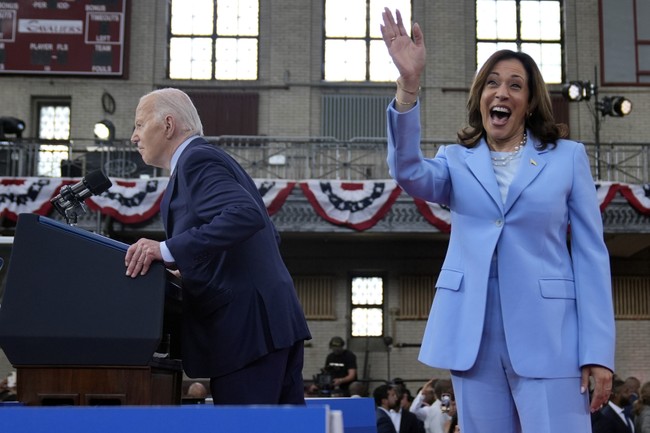Kamala Harris Faces Debate Prep Challenges
As the presidential debate approaches, Kamala Harris navigates rule changes and intensifies preparations amidst public scrutiny.
Published September 07, 2024 - 00:09am

Image recovered from redstate.com
As the presidential debate between Kamala Harris and Donald Trump nears on September 10, the Harris campaign finds itself amid a swirl of rule changes and intense debate preparations. Harris has been notably avoiding reporters, engaging only in a few controlled interviews. Recently, with the support of her 'emotional support governor', Tim Walz, she's been seen in Pennsylvania at her debate camp.
The primary contention in the lead-up to the debate has centered around whether the microphones should be muted when candidates are not speaking. This rule, initially requested by Joe Biden, is now being contested by Harris. Her campaign argues that she is 'fundamentally disadvantaged' by this rule, claiming it hampers substantial exchanges between candidates. Despite this contention, both the Harris and Trump campaigns recently agreed to the rules proposed by ABC News, stipulating that microphones will only be active for the candidate who has the floor to speak.
Amidst these discussions, the Harris campaign continues to push for specific verbal agreements. Brian Fallon, a Harris campaign official, emphasized that certain stipulations were critical in getting Harris to commit to the debate. The agreements allow moderators to manage interruptions and ensure the public hears crucial exchanges, even if microphones are muted. Despite ABC's claim that no new rules have been set beyond those agreed upon in May, the Harris team remains vocal about their concerns.
Adding to the complexity, the debate will be held without a studio audience to prevent disruptions, akin to a sports event atmosphere. This also means efforts will be in place to keep both microphones active during heated exchanges, ensuring the public remains informed.
Strategically, Harris has been preparing diligently, although reports suggest her focus on minute details has at times derailed sessions. This approach contrasts with the more spontaneous style often showcased by Trump, who strategically manages public and media expectations surrounding debate performances.
Biden, while having stepped back from the presidential race, continues to show support for Harris. His presence on the campaign trail in Pennsylvania highlights his enduring influence among Democratic voters, particularly within the working class. His collaboration with Harris aims to fortify her stance as a defender of middle-class and labor rights.
In her recent statements, Harris reaffirmed her commitment to strengthening the middle class while navigating contentious issues like fracking, which is economically significant in states like Pennsylvania. Her position reflects a balance between advancing clean energy policies and addressing job security concerns within the hydrocarbon sector.
The upcoming debate promises to be a pivotal moment, with both candidates expected to address core issues ranging from economic policies to election integrity. However, the setting underscores the ongoing challenges in maintaining decorum and fostering meaningful political discourse, reflecting broader tensions within the current political landscape.
As the nation watches closely, the performance of both candidates in this controlled environment will likely shape public perception and influence the trajectory of the campaigns as they progress towards the election.







